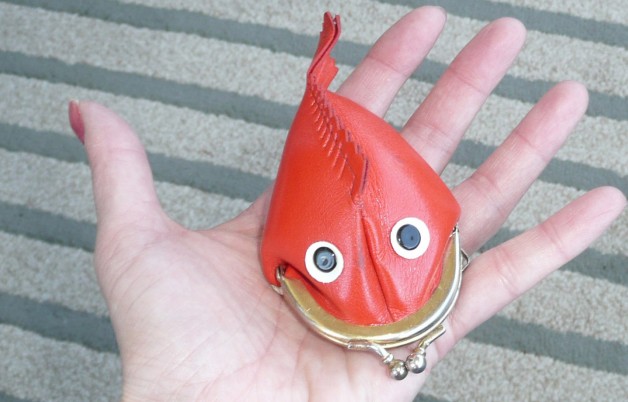When my grandmother took us kids to church, she always gave us little coin purses so that we would have something to put in the collection. The purses were decorated to look like fish—with cut-leather fins, and those eyes made of tiny clear plastic domes and big black disks rattling around inside for the pupils. Much of my time in Church was devoted to snapping and unsnapping the clasp of a mouth and gazing down into the belly of the fish at the chunk of change that—“at any moment”—I would be called upon to produce. At the time I had no idea that it was Jesus who initiated such an amusing way of paying “the temple tax.”
Some tax collectors asked Peter whether his teacher paid the temple tax. Jesus responded by instructing Peter: “Go to the sea and cast a hook, and take the first fish that comes up, and when you open its mouth you will find a shekel; take that and give it to them for me and for yourself” (Mt 17:27). It’s one of the more humorous parts of the Gospels, I think, comparable to Jesus’ image of the man with the lumbering beam jutting from his eye who still manages to notice a mote in his brother’s. Perhaps effortlessly producing a shekel from the sea was Jesus’ way of showing up the ridiculous irony of insisting that God incarnate pay some petty dues to his own Temple.
Think, too, of the coin and the fish—the one shiny and valuable, the other dumb and desperate to breathe, oblivious to what’s in its mouth and the improbability of its being there. Interpreting these motifs, one early writer recalls the Mosaic prescription, “Each will give as redemption of his soul to the Lord, a half shekel” (Ex 30:13), but “the true redemption,” he goes on, was Jesus himself, whose “giving of the half-shekel is a symbol of his own self-giving.” It’s not the only time that Jesus is compared to something inside the mouth of a fish. The Lord himself spoke of the sign of Jonah the prophet, who, after three days and three nights in the belly of a fish, was “vomited out upon the dry land” (Jon 2:10).
St. Cyril of Alexandria compares the Church and its members to the fish. Again, not unprecedented, for Christians are said to have been caught in the nets of the fishers of men. For me, the salient feature of the fish is ignorance—consider its slack jaw and big empty eyes. It’s an ignorance reminiscent of the child in church who cares more for his few coins than the priceless treasures dispensed from ambo and altar. Of course, it’s okay for a child to be childish, but an adult is called to be childlike.
Here we might distinguish between two kinds of ignorance about God. The first springs from the lethargy to which Moses spoke in Deuteronomy: “This commandment which I command you this day is not too hard for you, neither is it far off. It is not in heaven, that you should say, ‘Who will go up for us to heaven, and bring it to us, that we may hear it and do it?’ . . . But the word is very near you; it is in your mouth and in your heart, so that you can do it” (Dt 30:11-14).
The second is an ignorance of intimacy. Hence the prophet Isaiah speaks for God: “As the heavens are higher than the earth, so are my ways higher than your ways and my thoughts than your thoughts” (Is 55:9). Only by intimacy with God does the prophet really come to know his wonderful incomprehensibility.
Apparently, integral to Christ’s revelation of the Father is our own amusement. He teaches us to become like children by gently treating us as such. This Jesus, intimate and amusing, is not too high for us or too far off; he is very near us, in our mouths and in our hearts.
✠
Image: Vintage Fish Purse by Tina at Etsy.com







